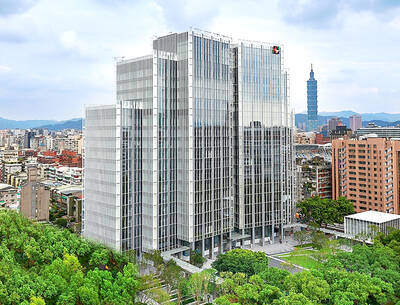Ford Motor Co plans to build its new Fiesta subcompact at a factory near Mexico City for sale in the US, the company said on Friday.
Ford plans to retool its Cuautitlan Assembly Plant from large-truck to small-car production as it moves to shift its factories from trucks toward more fuel-efficient vehicles, the company said.
The move is a blow to the United Auto Workers (UAW) union, which last year approved a contract that granted concessions to the automaker.
COST ADVANTAGE
Earlier this year, UAW president Ron Gettelfinger said the union would try to convince Ford that its US plants were competitive enough that the automaker could make money building its smallest cars in the US.
Gettelfinger conceded that Mexican factories have a cost advantage, but said the union isn’t interested in a race to the bottom in wages. Currently, all subcompacts sold in the US are built overseas, he said.
The Fiesta is critical to Ford’s effort to unify its global operations and sell versions of the same vehicle in markets worldwide. Three-and five-door hatchback versions will go on sale in Europe this fall and China by the end of the year. Other versions, including a four-door sedan, will reach the rest of Asia by next year. North America will get a four-door version as well as the European hatchback in 2010.
Ford has sold 12 million Fiestas since the vehicle was introduced in 1976. Although it is a familiar name to customers in Europe, Asia and South America, the Fiesta was only sold in the US from 1978 to 1980.
Ford also said on Friday that it plans a new diesel engine line at its at Chihuahua Engine Plant and a new joint venture transmission plant with Getrag in Guanajuato.
The Cuautitlan plant now makes trucks for the Mexican market, ranging from the Ford F-150 pickup to the F-550. The company plans to import trucks from the US in the future to free factory capacity for the new small cars, it said in a statement.
Overall, Ford and its parts suppliers will invest US$3 billion in Mexico as part of the Fiesta project, Ford said.
About 4,500 Ford jobs should be created at the plants, the company said.
WHAT PEOPLE WANT
“Ford is absolutely committed to leveraging our global assets to accelerate the shift to more fuel-efficient small cars and powertrain technologies that people really want and value,” Ford president and chief executive officer Alan Mulally said in a statement.
Mexican President Felipe Calderon made the announcement with Mulally at the presidential compound in Mexico City. As it loses more manufacturing jobs to China, Mexico has focused its energies on the automotive industry.
Calderon said the announcement was a “turning point” for Mexico.
“We want Mexico to be an automotive country, one that is competitive and with the most advantages so that the worldwide automotive industry will establish itself here,” Calderon said.

Alchip Technologies Ltd (世芯), an application-specific integrated circuit (ASIC) designer specializing in artificial-intelligence (AI) chips, yesterday said that small-volume production of 3-nanometer (nm) chips for a key customer is on track to start by the end of this year, dismissing speculation about delays in producing advanced chips. As Alchip is transitioning from 7-nanometer and 5-nanometer process technology to 3 nanometers, investors and shareholders have been closely monitoring whether the company is navigating through such transition smoothly. “We are proceeding well in [building] this generation [of chips]. It appears to me that no revision will be required. We have achieved success in designing

UNCERTAINTY: Investors remain worried that trade negotiations with Washington could go poorly, given Trump’s inconsistency on tariffs in his second term, experts said The consumer confidence index this month fell for a ninth consecutive month to its lowest level in 13 months, as global trade uncertainties and tariff risks cloud Taiwan’s economic outlook, a survey released yesterday by National Central University found. The biggest decline came from the timing for stock investments, which plunged 11.82 points to 26.82, underscoring bleak investor confidence, it said. “Although the TAIEX reclaimed the 21,000-point mark after the US and China agreed to bury the hatchet for 90 days, investors remain worried that the situation would turn sour later,” said Dachrahn Wu (吳大任), director of the university’s Research Center for

GROWING CONCERN: Some senior Trump administration officials opposed the UAE expansion over fears that another TSMC project could jeopardize its US investment Taiwan Semiconductor Manufacturing Co (TSMC, 台積電) is evaluating building an advanced production facility in the United Arab Emirates (UAE) and has discussed the possibility with officials in US President Donald Trump’s administration, people familiar with the matter said, in a potentially major bet on the Middle East that would only come to fruition with Washington’s approval. The company has had multiple meetings in the past few months with US Special Envoy to the Middle East Steve Witkoff and officials from MGX, an influential investment vehicle overseen by the UAE president’s brother, the people said. The conversations are a continuation of talks that

PROJECTION: KGI Financial said that based on its foreign exchange exposure, a NT$0.1 increase in the New Taiwan dollar would negatively impact it by about NT$1.7 billion KGI Financial Holding Co (凱基金控) yesterday said its life insurance arm has increased hedging and adopted other moves to curb the impact of the local currency’s appreciation on its profitability. “It is difficult to accurately depict the hedging costs, which might vary from 7 percent to 40 percent in a single day,” KGI Life Insurance Co (凱基人壽) told an investors’ conference in Taipei. KGI Life, which underpinned 66 percent of the group’s total net income last year, has elevated hedging to 55 to 60 percent, while using a basket of currencies to manage currency volatility, the insurer said. As different